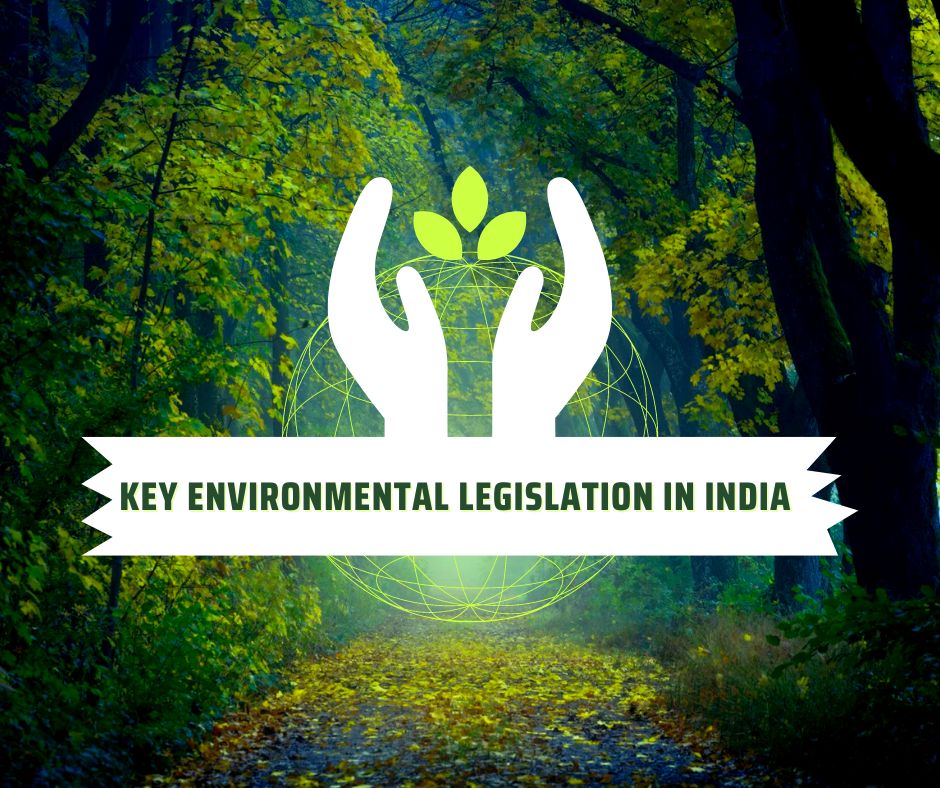Understanding environmental laws in India is crucial for future lawyers to address pressing challenges like pollution, climate change, and deforestation. The increasing urgency of addressing environmental challenges, such as:
- severe air and water pollution,
- rapid deforestation,
- climate change impacts, and
- loss of biodiversity
and the growing importance of sustainability means that more environmental law experts are needed in this field to help corporates comply with the legal and corporate frameworks.
As an environmental lawyer, familiarity with key environmental legislation and the role of the National Green Tribunal (NGT) is essential for effective advocacy and legal practice.
Let us discuss these laws in detail.
Key Environmental Legislation in India

Aspiring environmental lawyers need to know and interpret the key environmental legislation in India to work on the kind of cases they will encounter:
1. The Environment (Protection) Act, 1986
This Act aims to provide protection and improvement of the environment. It encompasses air, water, and land, focusing on reducing pollution and preventing environmental degradation. Through this Act, the Central Government is empowered to set environmental standards, regulate industrial locations, and take measures for environmental protection and improvement.
2. The Water (Prevention and Control of Pollution) Act, 1974
This Act led to the creation of Central and State Pollution Control Boards to monitor, prevent, and control water pollution. It provides guidelines for discharging pollutants into water bodies and mandates treatment facilities to ensure compliance with prescribed standards.
3. The Air (Prevention and Control of Pollution) Act, 1981
The Act sets air quality standards and empowers authorities to monitor and maintain these standards to protect public health and the environment. It regulates industrial emissions by setting permissible limits and mandates the use of pollution control equipment to mitigate air pollution.
4. The Forest (Conservation) Act, 1980
This Act imposes strict restrictions on the diversion of forest land for non-forest purposes, requiring central government approval for such activities. By conserving forests, this Act plays a critical role in preserving biodiversity and maintaining ecological balance.
5. The Wildlife (Protection) Act, 1972
The Act provides for the protection of endangered species of flora and fauna, prohibiting hunting and trading activities. It facilitates the establishment of National Parks, Wildlife Sanctuaries, and other protected areas to safeguard habitats and promote biodiversity conservation.
Some of the recent cases related to key environmental legislation in India are:
- In the case Municipal Corporation of Greater Mumbai v. Ankita Sinha (2021), the Supreme Court held that the right to a clean environment is a fundamental right under Article 21 of the Indian Constitution.
- In the M.C. Mehta v. Union of India (2021) case, the Supreme Court ordered the phasing out of old and polluting vehicles in Delhi to combat air pollution.
- In the T.N. Godavarman Thirumulpad v. Union of India (2022) case, the SC directed the states to submit reports on the status of forest conservation and compliance with the Forest Conservation Act.
These are just a few recent examples of cases related to environmental laws in India. If you want to play a role in protecting the environment or build a career in environmental law, many such cases are waiting for your intervention.
National Green Tribunal (NGT)

The National Green Tribunal (NGT) was established in 2010 under the National Green Tribunal Act. It has jurisdiction over all civil cases relating to environmental laws in India, including:
- the Environment (Protection) Act, 1986,
- the Water (Prevention and Control of Pollution) Act, 1974, and
- the Air (Prevention and Control of Pollution) Act, 1981.
The NGT provides expeditious disposal of cases concerning environmental protection and conservation of forests and natural resources as it follows a simplified procedure for adjudicating environmental disputes. NGT has the authority to summon and examine witnesses, order compensation for damages, and enforce legal rights related to environmental protection.
The tribunal’s decisions are binding and enforceable as a decree of a civil court. Some of the notable judgments by the NGT include:
- the banning of diesel vehicles over 10 years old in Delhi to combat air pollution, and
- the Art of Living case where the tribunal imposed a fine for environmental damage caused during a cultural event on the Yamuna floodplains.
Environmental lawyers play a crucial role in NGT proceedings. They represent parties in environmental litigation, advocate for stricter enforcement of key environmental legislation, and help draft petitions and legal strategies to address environmental violations. Their expertise is vital for ensuring compliance with environmental laws and protecting ecological interests.
The NGT continues to be a pivotal forum for addressing environmental grievances and promoting sustainable development in India.
Different Types of Environmental Law Careers You Can Go For

BA LLB students at SMS Law College, who want to become environmental lawyers, can choose a wide range of career paths. These include:
A. Litigation and Advocacy:
As an environmental litigator, you’ll represent clients in the National Green Tribunal (NGT) and other courts, advocating for environmental justice and enforcement of key environmental legislation.
You can also challenge environmentally harmful projects, fight for compensation for affected communities, and hold polluters accountable.
B. Policy and Regulatory Work:
Environmental lawyers are instrumental in shaping environmental policy and regulations. You can work for government agencies or NGOs, drafting laws, influencing policy decisions, and ensuring compliance with environmental standards.
Your work will contribute to creating a more sustainable and eco-friendly regulatory framework for India.
C. Corporate Environmental Compliance:
Many companies seek environmental lawyers to ensure their operations adhere to environmental laws in India. You can help businesses develop and implement environmental management systems, conduct audits, and advise on legal compliance, contributing to responsible corporate behaviour and sustainable practices.
D. Research and Academia:
If you have a passion for research and teaching, a career in environmental law academia might be for you. You can conduct research on emerging environmental issues, publish scholarly articles, and teach the next generation of environmental lawyers.
Your work can contribute to the development of new legal frameworks and solutions for environmental challenges.
Not only this, the field of environmental law is constantly evolving – with new areas emerging due to pressing global challenges. Some of the exciting new fields include:
- Climate Change Law: Addressing legal issues related to climate change mitigation and adaptation, such as carbon markets, renewable energy regulation, and climate litigation.
- Biodiversity Law: Protecting and conserving biodiversity through legal frameworks, international agreements, and enforcement mechanisms.
- Environmental Justice: Ensuring equitable access to environmental resources and protection from environmental harm for all communities, particularly marginalised and vulnerable populations.
The need for skilled environmental lawyers is growing in India. By choosing a career in this field, you can contribute to a sustainable future and make a meaningful impact on society and the environment.
Conclusion
If you admire Nature, working for the corporate might be something you end up hating. Being a corporate lawyer might be a more plush job but then, you might end up defending the environmental violator! And if you can’t go against your conscience, you need to study environmental laws in India to protect the environment.
You can work for Environment Support Groups, take up cases on water pollution, RTI activism, and plastic and waste management, and do environmental consultation work. You can train the forest officers who need to make sure that there’s no violation of the Wild Life Protection Act and the Forest Act.
If you are interested in becoming an environmental lawyer, contact your professors and we will guide you on how to launch yourself in an environmental law career.




